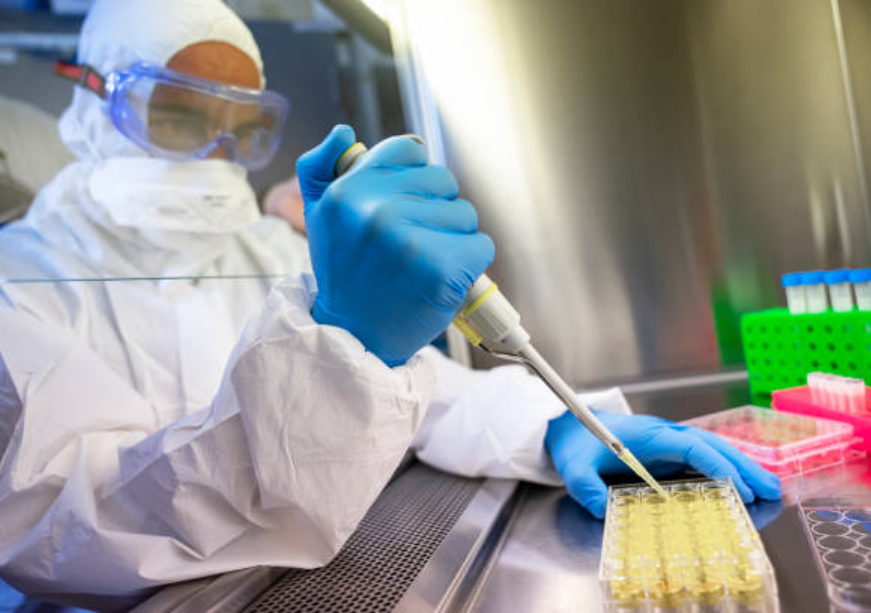-
CENTRES
Progammes & Centres
Location
Enhanced collaboration between the US and India on biosecurity and biosafety under iCET could be highly advantageous

India’s National Security Advisor, Ajit Doval and the US National Security Advisor, Jake Sullivan, recently reviewed potential areas of cooperation under the Initiative on Critical Emerging Technologies (iCET). Biotechnology was identified as a key area of cooperation that poses significant economic potential and requires attention from a security perspective. Presently, the initiative has not indicated any specific agenda on areas of bilateral cooperation in biotechnology, necessitating the need for an understanding of the current status of cooperation on biosecurity and biosafety, its significance, and a future roadmap for deliberation.
The COVID-19 pandemic has highlighted the imperative for robust pathogen surveillance systems, the enforcement of practices that regulate critical areas of biological research, and the need for global multidisciplinary approaches to addressing diseases and biological disasters.
The COVID-19 pandemic has highlighted the imperative for robust pathogen surveillance systems, the enforcement of practices that regulate critical areas of biological research, and the need for global multidisciplinary approaches to addressing diseases and biological disasters. Biosecurity is concerned with protection against the threat of biological agents while biosafety premises around the regulations placed to prevent laboratory accidents and the accidental release of pathogens. The United States (US) has launched a Biosafety and Biosecurity Innovation Initiative under an executive order that aims to promote research in the life sciences whilst addressing vulnerabilities and risks associated with the biotechnology sector. India, on the other hand, introduced a Public Health (Prevention, Control and Management of Epidemics, Bio-terrorism and Disasters) Bill in 2017 but there is no information on the status of this bill and its inclusions. As health security experts are still reeling in the aftermath of the pandemic, the inherent need to develop formal institutional mechanisms to address biosecurity and biosafety is paramount. The bilateral partnership under iCET will enable “an open, accessible, and secure technology ecosystem, based on mutual trust and confidence, that will reinforce our democratic values and democratic institutions.” This will entail the bridging of technological endeavours “between the governments, businesses, and academic institutions” and will facilitate technological innovation and ease regulatory barriers. Accordingly, the iCET serves as an ideal platform for the two countries to collaborate on these pressing issues.
Biotechnology cooperation between the two countries is presently managed through the 1.5-Track Biosecurity Dialogue jointly hosted by the John Hopkins Centre for Health Security and the Regional Centre for Biotechnology, an autonomous institution of the Department of Biotechnology. This partnership has identified several areas of cooperation including, increased bilateral engagement at the government level, a “One Health” approach to addressing emerging and re-emerging biological threats, measures to account for misinformation and disinformation campaigns, and measures to ensure safety within laboratories. This year’s dialogue is to be convened in New Delhi, but the dates have not yet been finalised, highlighting the need for additional fora to support these discussions. Later this year, the US National Academies of Sciences, Engineering and Medicine will host a workshop series on biotechnology cooperation under iCET with an emphasis on training personnel in the management of infectious diseases and in the formulation of methodologies to promote biosafety. Finally, the US is set to pass a new Biosecure Act, which aims to limit the country’s reliance on China for its pharmaceutical needs citing national security risks that certain Chinese entities pose. If passed, this legislation will pave the way for significant opportunities for Indian CDMOs and iCET could serves as a unique platform for the development of risk assessment frameworks in the pharmaceutical sector. Despite these ventures, there exists multiple opportunities to bolster biosecurity and biosafety under the iCET domain.
Biotechnology has made significant strides, particularly in the development of vaccines, diagnostics, drugs, and medical devices but a concerning area is the ‘dual-use dilemma.’ A considerable amount of life science research provides substantial health benefits but it also holds the potential to be misused to create harm. For instance, synthetic biology is responsible for the development of antibodies and mRNA vaccines, but it also poses the very real possibility of being utilised by rogue actors to synthesise biological agents that are intended to cause harm and destruction. This highlights the need to develop mechanisms to identify potential risks associated with the use of life science technologies and to develop regulatory frameworks that manage these risks without compromising the potential benefits these technologies bring to the wider society.
Biotechnology has made significant strides, particularly in the development of vaccines, diagnostics, drugs, and medical devices but a concerning area is the ‘dual-use dilemma.’
The formulation of risk and innovation frameworks will require multiple stakeholders from the research community, academia, the private sector, security experts from the government, public health professionals, and members of think tanks. As considerable advances are made in biotechnology, there is an emerging need for researchers and academics to recognise the dual-use potentiality of their research, while security experts may not understand how advanced biotechnologies can be misused. This is most relevant to the pharmaceutical industry, which faces dual-use concerns in its platform-based vaccine development. Catalysed by the development of COVID-19 vaccines, Indian and US pharmaceutical companies have ventured into the development of vaccines based on non-traditional platforms, including mRNA-based, virally vectored, DNA-based, and recombinant protein expression system-based systems. Efforts are in place to ensure these platforms exhibit low risk of dual-use potential but taking into consideration the novelty of these platforms, there exists a need for researchers to comprehend and assess each technology’s risk. This demonstrates the need for collaborative approaches between the biotechnology and security communities, and the opportunity for representatives from India and the US to bridge this gap. In a similar vein, workshops and other training activities can be jointly held under the aegis of iCET to enhance awareness about laboratory safety and proper handling of microbial organisms and biological equipment. These endeavours can prevent accidental or inadvertent harm caused by biological experiments and will ensure that research is carried out in a safe and responsible manner.
The COVID-19 pandemic highlighted limitations in health surveillance systems, thus necessitating a collaborative approach between the US and India to enhance health intelligence networks in preparation for potential biological outbreaks, disasters, or terrorist attacks. Disease outbreaks, including the ongoing H5N1 avian influenza epidemic across US poultry farms and India’s Nipah virus outbreaks, have been exacerbated by anthropogenic factors, including climate change and population growth, and emphasise the need for a “One Health” approach to ensuring biosecurity. Policymakers need to understand the ability of zoonotic viruses to cross species barriers and the anthropogenic factors that exacerbate these spillover events. Intergovernmental cooperation can significantly enhance pathogen detection and response measures to safeguard the health of humans, animals, and plants alike.
The COVID-19 pandemic highlighted limitations in health surveillance systems, thus necessitating a collaborative approach between the US and India to enhance health intelligence networks in preparation for potential biological outbreaks, disasters, or terrorist attacks.
The US’ Centers for Disease Control and Prevention (CDC) and India’s National One Health Mission can network to devise methods to formulate appropriate responses to infectious disease outbreaks in plants, animals, and humans. In addition, these initiatives can build Indo-US centres that focus on environmental surveillance, including wastewater and forest ecosystems, acquisition of metagenomic data and clinical information, and generate real-time information on impending outbreaks. Systematic collection, dissemination, and analysis of health intelligence can enable the early detection and identification of potential health emergencies. Presently, the monitoring of health events is carried out by the National Centre for Medical Intelligence and the Central Bureau of Health Intelligence in the US and India, respectively. These institutional bodies can widen their scope to devise response strategies to address unknown biological threats through microbial forensics and threat characterization. Furthermore, biosecurity efforts can extend to collaborative ventures in other disciplines such as cybersecurity. Taking into consideration the sensitivity of health systems information, iCET can serve as a vehicle for these sectors to collaborate on measures to strengthen the health sector’s cybersecurity network and ensure its protection from malevolent actors.
Rapid advancements in biotechnology necessitate a robust regulatory framework to ensure biosecurity and biosafety. Partnerships between American and Indian private sector and regulatory bodies can result in the development of schemes to assess the biosecurity risks associated with novel biotechnologies. Similarly, knowledge transfer mechanisms can aid in educating the biotechnology and security communities. Furthermore, collaborative approaches to health intelligence networks can provide valuable information on transnational biological threats. iCET is an ideal platform for deliberations around dual-use research and disease surveillance and can pave the way for other cooperative instruments through industrial and academic partnerships, pandemic-preparedness exercises, and training programmes to ensure a resilient biosecurity apparatus.
Lakshmy Ramakrishnan is an Associate Fellow at the Observer Research Foundation.
The views expressed above belong to the author(s). ORF research and analyses now available on Telegram! Click here to access our curated content — blogs, longforms and interviews.

Lakshmy is an Associate Fellow with ORF’s Centre for New Economic Diplomacy. Her work focuses on the intersection of biotechnology, health, and international relations, with a ...
Read More +